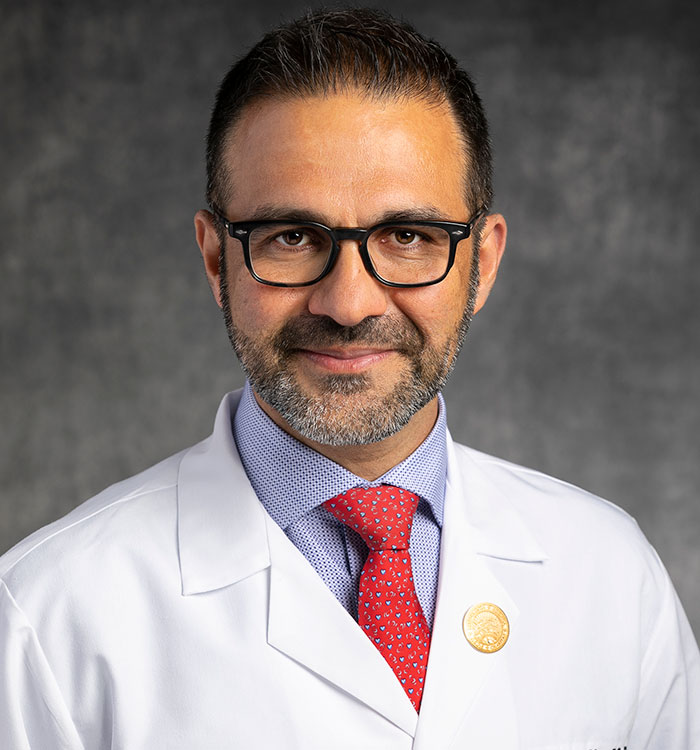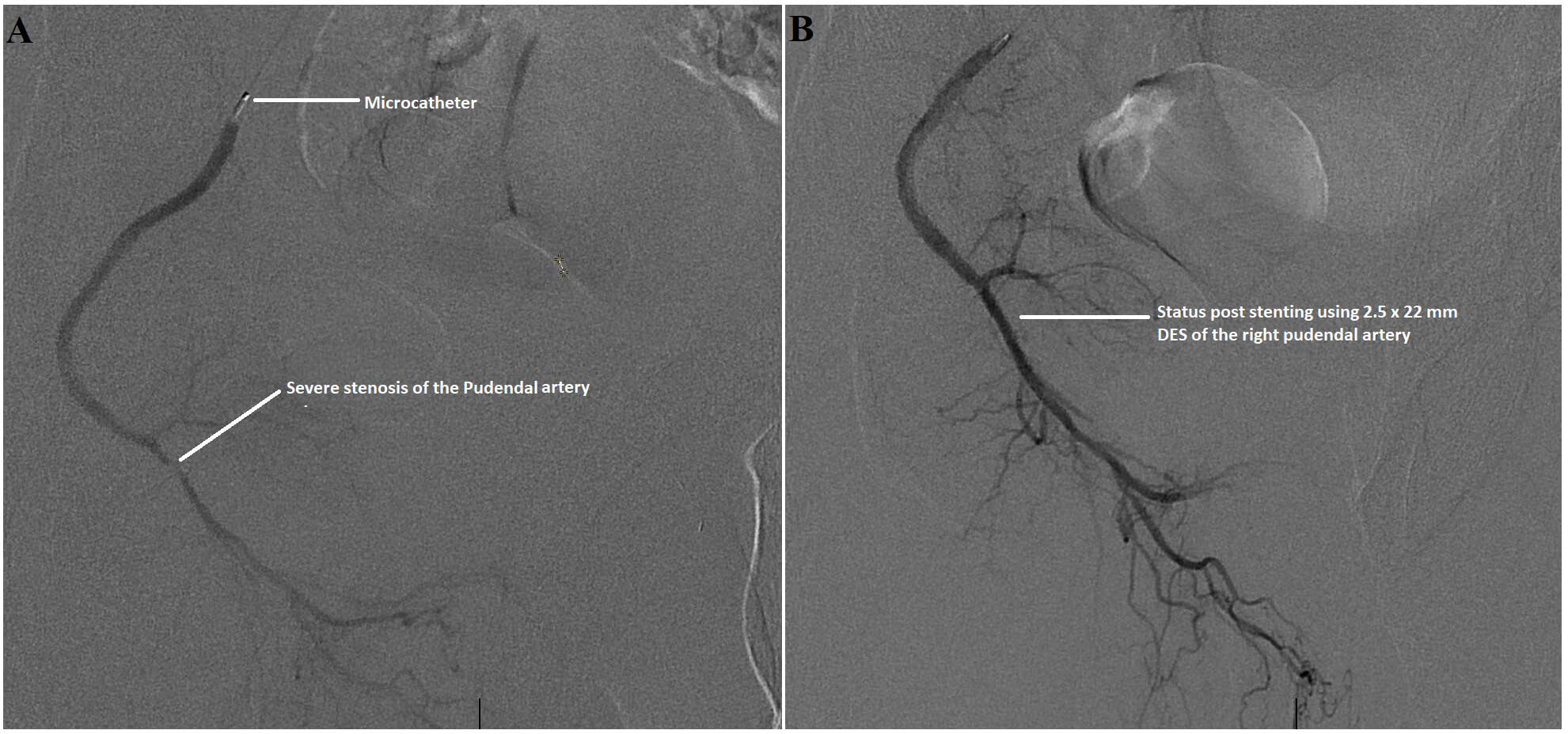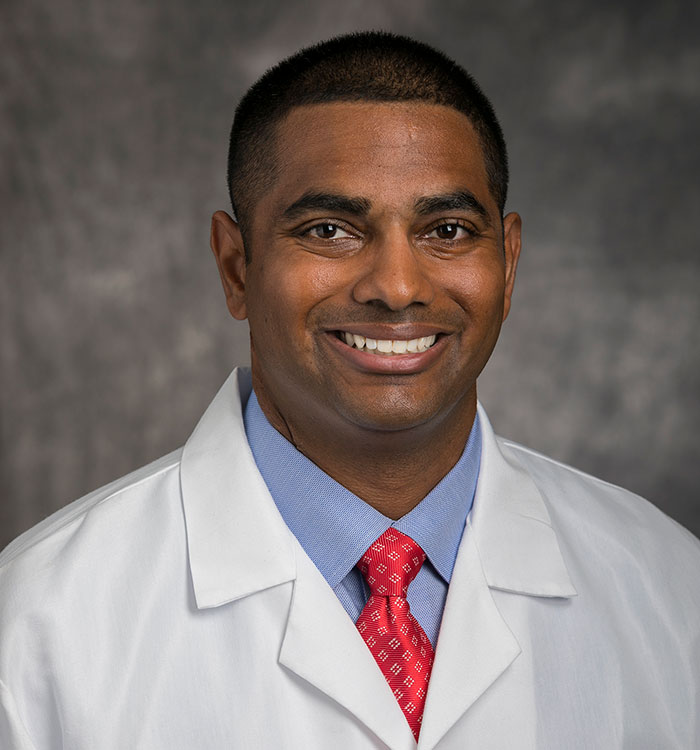University Hospitals Cleveland Medical Center Launches New, Relatively Rare Program for Treating ED
November 16, 2021
Endovascular procedure can address vasculogenic ED
Innovations in Cardiovascular Medicine & Surgery | Fall 2021
Men with erectile dysfunction (ED) caused by blockages in the arteries that supply the penis – vasculogenic ED – have access to a new, relatively uncommon treatment option at University Hospitals Cleveland Medical Center.
In collaboration with University Hospitals Urology Institute, interventional cardiologist Mehdi H. Shishehbor, DO, MPH, PhD, President of University Hospitals Harrington Heart & Vascular Institute and the Angela and James Hambrick Master Clinician in Innovation, brings extensive experience using angioplasty and stenting to address these blockages. He has treated patients who have traveled to Cleveland from distant states, Canada, Europe and around the world, specifically for the endovascular procedure.
 Mehdi H. Shishehbor, DO, MPH, PhD
Mehdi H. Shishehbor, DO, MPH, PhD“In the past, we didn’t have a very good treatment for this,” Dr. Shishehbor says. “However, now we have better techniques. We have special wires and special balloons. The same way that we can get into the brain and fix a blockage in the brain, the same way that we can get into the heart and fix a blockage in the heart, we can now improve blood flow to the penis by performing angioplasty and stenting, removing and pushing to the side those blockages that are preventing the blood from getting to the penis. We have extensive experience with this procedure, and we have published a number of articles around the technical aspects, but it is not something that is widely done. Not every center offers this.”
Men undergoing the minimally invasive endovascular procedure for vasculogenic ED at University Hospitals Cleveland Medical Center are under conscious sedation. The entire procedure takes about an hour to 90 minutes.
Studies show that the approach is effective.
“There have been a number of studies around vasculogenic ED and the utility of angioplasty or stenting,” Dr. Shishehbor says. “Overall, they’ve been positive."
Men with this form of ED have virtually the same risk factors as those for atherosclerosis, Dr. Shishehbor says: smoking, hypertension, hyperlipidemia and diabetes. They also tend to have pre-existing cardiovascular disease.
“If somebody has had a heart attack or coronary artery disease, they’re at risk for having vasculogenic ED,” he says.
According to Dr. Shishehbor, a necessary condition for a successful vasculogenic ED program is collaboration among the multiple relevant disciplines that treat ED – endocrinology, urology and the endovascular specialist. At University Hospitals Cleveland Medical Center, the treatment algorithm for these patients outlines that the patient first undergoes a full evaluation by a urologist at University Hospitals Urology Institute, including blood testing and an ultrasound of the pelvis and penis to pinpoint root causes of ED.
“If the hormones are ok, and the ultrasound shows that there is evidence of narrowing in the blood vessels to the penis, they then typically get referred to someone like me,” he says. “To have this kind of program, it’s so important to have urologists, endocrinologists, and endovascular specialist working together to take care of these patients.”
 Caption: Severe atherosclerotic stenosis of the right pudendal artery (Panel A), in a middle-aged man with erectile dysfunction, was treated successfully and percutaneously using a drug eluting stent (Panel B).
Caption: Severe atherosclerotic stenosis of the right pudendal artery (Panel A), in a middle-aged man with erectile dysfunction, was treated successfully and percutaneously using a drug eluting stent (Panel B). Nannan Thirumavalavan, MD
Nannan Thirumavalavan, MD“This multidisciplinary approach allows us to provide comprehensive care for our men struggling with erectile dysfunction,” says Nannan Thirumavalavan, MD, Chief of Male Reproductive and Sexual Health at University Hospitals Urology Institute. “We look at all the factors that goes into having good erections, including hormones and blood flow to the penis. For the right patient, this novel treatment could help men have natural erections again, without requiring medications.”
The vasculogenic ED program at UH Cleveland Medical Center is new and not yet well-known, but Dr. Shihshehbor hopes that this will soon change. He looks forward to collaborating with the new University Hospitals Cutler Center for Men, he says, to bring this therapy to more patients. In his experience, the need is great and patients are extremely motivated to find solutions for their ED.
“ED has significant quality of life and psychosocial impacts,” Dr. Shishehbor says. "I’ve even had patients refuse to take their heart medications because they want to take Viagra – it’s that important for them to be sexually active.”
“There are potentially many patients who could benefit from this therapy,” he adds. “The opportunity to have a comprehensive evaluation of men with ED, and being able to help the subset that have vasculogenic ED is huge. It’s an opportunity for UH to help many, many patients.”
If you have a patient who wishes to be evaluated for this new vasculogenic ED program at University Hospitals Cleveland Medical Center, please contact University Hospitals Urology Institute to schedule an appointment at 216-868-8791.
Contributing Experts:
Mehdi H. Shishehbor, DO, MPH, PhD
President, University Hospitals Harrington Heart & Vascular Institute
Angela and James Hambrick Master Clinician in Innovation
Professor of Medicine
Case Western Reserve University School of Medicine
Nannan Thirumavalavan, MD
Chief, Male Reproductive and Sexual Health
University Hospitals Urology Institute
Assistant Professor of Medicine
Case Western Reserve University School of Medicine


